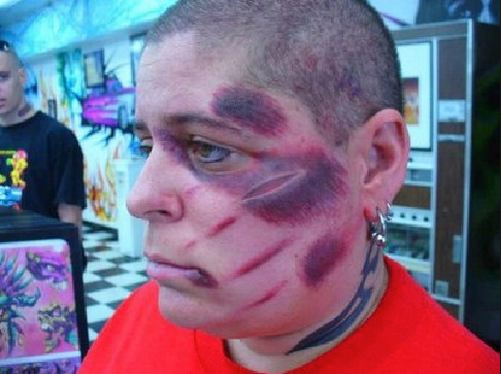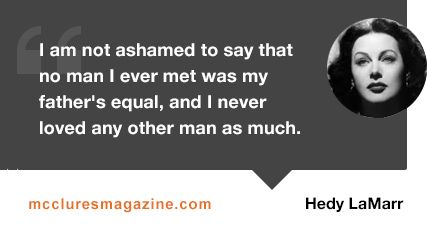“If she felt like she was being disrespected, she would swing at me. There was always something to argue about and usually, it was girls.”
“She was so insecure,” LaTesha recalled. “If I’d be hanging out with one of my friends who was a girl, she’d see me and say ‘What’s this? You cheating on me?’
And I always told her, ‘You need to stop.’ It was a pattern. We would break up for a week, get back together the next week. We must have broken up about 20 times.”
The final break-up happened when Monique landed several punches on LaTesha in front of a community center in Queens.
Though it is seldom reported, this kind of physical abuse among lesbian couples is not at all unusual.
According to a 2010 CDC (Center for Disease Control) study, 46 percent of lesbian women report having been a victim of domestic violence, compared to 43 percent of straight women.
Women abuse other women at a higher rate than men do.
Researchers from the Journal of Interpersonal Violence found that 90 percent of lesbians had been recipients of verbal aggression, with 31 percent reporting physical abuse.
In a survey of 1,099 lesbians, the Journal of Social Service Research found that “slightly more than half of lesbians reported that they had been abused by a female lover/partner.
In Sweden, two related studies found that reports of domestic violence among heterosexual women were 8 percent. But the rate among lesbian women was between 17% and 45% depending on the study.
Yet there is a wall of silence within the lesbian community about domestic violence, and the lesbian community is reluctant to address the issue. It has even been referred to as “the second closet”.
There is a fear of making the community look bad. There’s an idea that airing dirty laundry discredits the lesbian community.
Whether a lesbian or not, there is a belief that women are the “gentle” sex. Nurturing, kind, tolerant, compassionate, understanding, accepting, caring, and so on.
And while that is often true, it is also often not true.
According to a University of Florida study, women are more than twice as likely to stalk, attack and psychologically abuse their partners than men are.
“We’re seeing women in relationships acting differently nowadays than we have in the past,” said Angela Gover, a UF criminologist who led the research.
Contrary to public perception, research shows that the most likely physical abuser of a young child will be that child’s mother, not a male in the household, although the mother’s plight often is complicated by a cohabiting male.
Biological fathers are the most protective of children, while step-fathers and boyfriends remain frequent abusers.
Abusive mothers frequently feel isolated, and lack the support to maintain their self-esteem and to buffer the stress of raising children.
Without this support, they often seek care and comfort from their children, treating these children as if they were older than they really are. When children fail to provide this support, the mother can become impatient, angry, and sometimes abusive, even when the child is only a crying infant.
Others find any social stimulation from their babies (whether smiling or crying) to be much more irritating than normal mothers do. Their abuse in turn adds to their anxiety and feelings of helplessness.
If the woman is a second-generation or later generation out-of-wedlock mother, or if she is a teenager, she is less likely to know what the appropriate expectations of a young child should be.
Statistically speaking, there is no safer place for a child than with their father, and there is no safer place for a woman than with her husband.
It’s not politically correct to say, but that’s the way it is.
Related Reading:
White Privilege Debunked
The Practical Feminist
Equal Pay for Equal What?
How Men and Women Think Differently




“Without this support, they often seek care and comfort from their children, treating these children as if they were older than they really are. When children fail to provide this support, the mother can become impatient, angry, and sometimes abusive, even when the child is only a crying infant.”
That rings so true for my childhood that I almost started crying reading it. I can remember how often my mother expected me to be her equal in terms of intelligence and responsibility, and when I wasn’t she’d call me stupid and lazy. I remember times when she’d sit me down and talk at me for literally hours about all her worldly problems, and often detailing how I was the cause of them.
do you know about Alice Miller:
http://www.alice-miller.com/
“Child Mistreatment, Child Abuse What is it?
Humiliations, spankings and beatings, slaps in the face, betrayal, sexual exploitation, derision, neglect, etc. are all forms of mistreatment, because they injure the integrity and dignity of a child, even if their consequences are not visible right away. However, as adults, most abused children will suffer, and let others suffer, from these injuries. This dynamic of violence can deform some victims into hangmen who take revenge even on whole nations and become willing executors to dictators as unutterably appalling as Hitler and other cruel leaders. Beaten children very early on assimilate the violence they endured, which they may glorify and apply later as parents, in believing that they deserved the punishment and were beaten out of love. They don’t know that the only reason for the punishments they have ( or in retrospect, had) to endure is the fact that their parents themselves endured and learned violence without being able to question it. Later, the adults, once abused children, beat their own children and often feel grateful to their parents who mistreated them when they were small and defenseless.
This is why society’s ignorance remains so immovable and parents continue to produce severe pain and destructivity – in all “good will”, in every generation. Most people tolerate this blindly because the origins of human violence in childhood have been and are still being ignored worldwide. Almost all small children are smacked during the first three years of life when they begin to walk and to touch objects which may not be touched. This happens at exactly the time when the human brain builds up its structure and should thus learn kindness, truthfulness, and love but never, never cruelty and lies. Fortunately, there are many mistreated children who find “helping witnesses” and can feel loved by them.”